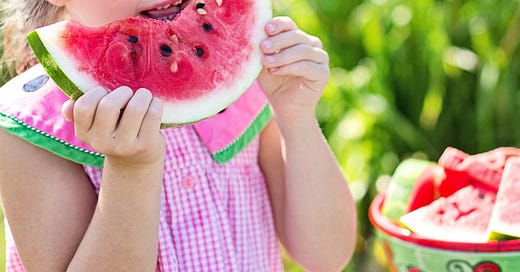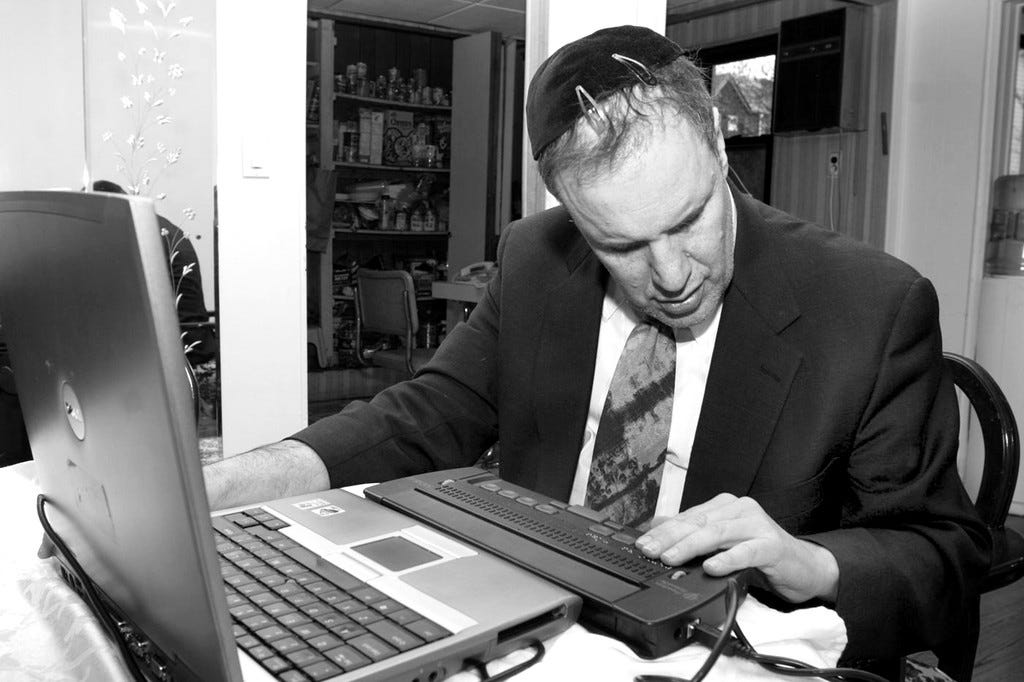Today, we’re celebrating Tu Bishvat, eating the fruits that herald the coming spring in the land of Israel, and enjoying the “fruits of our labor” during North American Jewish Disability Inclusion and Awareness Month.
So, why am I thinking about watermelons?
Watermelons are a delicious part of the summer camping experience.
You cool down by eating them on the grass between two innings of baseball.
You accidentally(?) squirt the juice at a nearby counselor.
Call to Action—Planning a Juicy Summer 2025 Experience for Campers with Disabilities
Some handy tips:
Don’t assume that an integrated camp is impossible. Children with disabilities may need accommodations. However, they may not need round-the-clock monitoring by a counselor who acts like a shadow.
Integrated camps don’t coddle campers. They experience Mother Nature at her best and worst. They stay up wayyyy past bedtime to gaze at a lunar eclipse. The loudspeaker squawks: “Everybody out of the pool!” Sudden moist gusts chase campers fleeing towards shelter. Just as they reach their bunk, and ear-splitting thunderclap shakes every loose board in the rafters!
Disabled campers can make friends outside of academic settings where their impairments may make them feel inferior.
They can learn that some nondisabled kids ALSO come in last, are disciplined for rule-breaking, and get homesick.
They can huddle under the covers, just a bit scared, as the counselor tells the story of the “monster” lurking somewhere in the woods nearby. (For dramatic effect, another counselor planted outside can suddenly cry out in panic.)
They can gorge themselves at the end-of-summer camp banquet. There, the secret camp photographer might show the camp video of the camp director himself walking around all day with two yarmulkas on his head. Nobody dared tell him.
At the best banquets, every camper gets an award:
The quietest;
The one most likely to be a counselor in ten years because she knows all the tricks;
The one who made his taciturn counselor laugh so loud that everybody was awestruck;
The best climber, who hid scores of one-serving cereal boxes in the rafters.
The one who read the most library books;
The one who PRETENDED to read the most library books;
The good sport who loudly applauded the winners of her rival color war team;
The first person up and dressed on chilly mornings.
Surely every camper with a disability can receive an award.
But PLEEZE!
NO awards for courage or being the most special person in his bunk.
Unless he’s the one that trapped the GIANT MOSQUITO, with a wingspan of almost three feet.
Challenge Question for Camper with Disabilities:
Where will you be eating your watermelon this summer? It’s time to start planning.
A native of Bradley Beach, New Jersey, Rabbi Michael Levy attributes his achievements to G-d's beneficence and to his courageous parents. They supported him as he learned to travel independently, visited Israel, and became more Jewishly observant. For 65 years, JBI International supported him with braille and recorded Judaica material.
He received rabbinic ordination from the Jewish Theological Seminary in 1981 and an MSW from Columbia University in 1982.
As a board member and now President of Yad Hachazakah, Rabbi Levy strives to make the Jewish experience and Jewish texts accessible to Jews with disabilities. In lectures at synagogues, camps, and educational institutions, he cites Nachshon, who according to tradition boldly took the plunge into the Red Sea even before it miraculously parted. Rabbi Levy elaborates, "We who have disabilities should be Nachshons--boldly taking the plunge into the Jewish experience, supported by laws and lore that mandate our integration.”
He applauds Jewish Disability Inclusion News’s ambition to give voice not just to those who work with the disabled, but also to people with disabilities themselves. “About us? Not without us” he is fond of reminding those eager to listen, and the media to whom the maxim may be out of their comfort zone.
For over 20 years, Rabbi Levy served as director of Travel Training at MTA New York CityTransit. Now retired, he is an active participant in Congregations Aish Kodesh and Young Israel in Woodmere, New York. Most of all, he relishes the company of his children, grandchildren, and large extended family.




